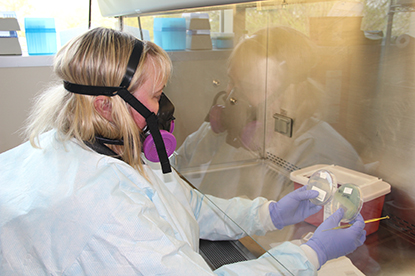
| Feb. 2016 | |||||||||||
| Top stories | |||||||||||
| In the news | |||||||||||
| Photos | |||||||||||
| Contact us | |||||||||||
| Archive | |||||||||||
|
CDC chooses lab for tuberculosis genotyping |
The State Hygienic Laboratory is one of five state public health laboratories selected as pilot reference centers to provide whole genome sequencing of Mycobacterium tuberculosis (MTB) isolates using next generation sequencing.
 Jennifer Elwood, clinical laboratory technical specialist, checks bacterial plates for growth to perform extractions for tuberculosis using next generation sequencing.
Jennifer Elwood, clinical laboratory technical specialist, checks bacterial plates for growth to perform extractions for tuberculosis using next generation sequencing.
The Association of Public Health Laboratories and the CDC’s Division of Tuberculosis Elimination (DTBE) chose the Hygienic Lab along with the Michigan Department of Health, the New York State Department of Health-Wadsworth Center, the California Department of Public Health-Microbial Diseases Laboratory and the Ohio Department of Health Laboratory.
Lucy DesJardin, director of the Office of Research and Development and principal investigator of the project, said that including the Hygienic Laboratory in this competitive process indicates the laboratory’s capability to assist CDC with advancing its next generation sequencing program in MTB research and outbreak investigation.
“The receipt of this award allows the Hygienic Laboratory staff members to showcase our expertise in both MTB isolation and identification, as well as our ability to perform molecular testing and analyses, including next generation sequencing,” said DesJardin.
MTB is the bacterium that causes tuberculosis. Because it can be spread from person to person through the air, it is a major public health threat. Whole genome sequencing using next generation sequencing is an important new tool to assist in tuberculosis control and elimination by allowing quick genotyping – or DNA fingerprinting – of the bacterium for more precise strain characterization.
DNA fingerprints can assist local officials to more specifically identify the spread of the infection, and to trace people who may have been exposed to illnesses and become infected. At the patient level, genotyping can also identify potential antibiotic-resistant genes to improve individual patient treatment.
The MTB project will be used to evaluate the best way to make next generation sequencing available, by comparing the use of state and local public health laboratories, regional reference centers and a single contract laboratory as reference centers.
The five public health laboratories chosen for this study will sequence samples provided by CDC to support investigations of selected MTB clusters. Some of the five centers will work within their specific jurisdiction – city, county, region or state – to run a universal MTB whole genome sequencing surveillance pilot plan. The Hygienic Laboratory will sequence 16 samples of MTB per month for the next five years to support the DTBE Laboratory Branch in outbreak investigation and strain characterization.